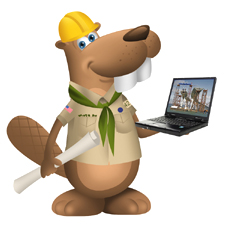Engineering


Resources
Engineering Requirements
Current Scouts BSA requirements
as of February 19, 2026
as of February 19, 2026
1.
Select a manufactured item in your home (such as a toy or an appliance)
and, under adult supervision and with the approval of your counselor,
investigate how and why it works as it does. Find out what sort of
engineering activities were needed to create it. Discuss with your
counselor what you learned and how you got the information.
2.
Select an engineering achievement that has had a major impact on society.
Using resources such as the internet (with your parent or guardian's
permission), books, and magazines, find out about the engineers who made
this engineering feat possible, the special obstacles they had to overcome,
and how this achievement has influenced the world today. Tell your
counselor what you learned.
3.
Explain the work of six types of engineers. Pick two of the six types and
explain how their work is related to engineering.
4.
Visit with an engineer (who may be your counselor, parent or guardian) and
do the following:
a.
Discuss the work this engineer does and the tools the engineer uses.
b.
Discuss with the engineer a current project and the engineer's
particular role in it.
c.
Find out how the engineer's work is done and how results are achieved.
d.
Ask to see the reports that the engineer writes concerning the project.
e.
Discuss with your counselor what you learned about engineering from
this visit.
5.
Use the systems engineering approach to design an original piece of patrol
equipment, a toy or a useful device for the home, office or garage.
6.
Do TWO of the following:
a.
Transforming Motion. Using common materials or a construction
set, make a simple model that will demonstrate motion. Explain how the
model uses basic mechanical elements like levers and inclined planes to
demonstrate motion. Describe an example where this mechanism is used in
a real product.
b.
Using Electricity. Make a list of 10 electrical appliances in
your home. Find out approximately how much electricity each uses in one
month. Learn how to find out the amount and cost of electricity used in
your home during periods of light and heavy use. List five ways to
conserve electricity.
c.
Understanding Electronics. Using an electronic device such as a
smartphone or tablet computer, find out how sound, video, text or
images travel from one location to another. Explain how the device was
designed for ease of use, function, and durability.
d.
Using Materials. Do experiments to show the differences in
strength and heat conductivity in wood, metal, and plastic. Discuss
with your counselor what you have learned.
e.
Converting Energy. Do an experiment to show how mechanical,
heat, chemical, solar, and/or electrical energy may be converted from
one or more types of energy to another. Explain your results. Describe
to your counselor what energy is and how energy is converted and used
in your surroundings.
f.
Moving People. Find out the different ways people in your
community get to work. Make a study of traffic flow (number of vehicles
and relative speed) in both heavy and light traffic periods. Discuss
with your counselor what might be improved to make it easier for people
in your community to get where they need to go.
g.
Building an Engineering Project. Enter a project in a science or
engineering fair or similar competition. (This requirement may be met
by participation on an engineering competition project team.) Discuss
with your counselor what your project demonstrates, the kinds of
questions visitors to the fair asked you, and how well you were able to
answer their questions.
7.
Explain what it means to be a registered Professional Engineer (P.E.). Name
the types of engineering work for which registration is most important.
8.
Study the Engineer's Code of Ethics. Explain how it is like the Scout Oath
and Law.
9.
Explore careers related to this merit badge. Research one career to learn
about the training and education needed, costs, job prospects, salary, job
duties, and career advancement. Your research methods may include—with
your parent or guardian's permission—an internet or library search, an
interview with a professional in the field, or a visit to a location where
people in this career work. Discuss with your counselor both your findings
and what about this profession might make it an interesting career.